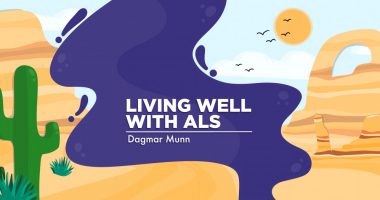Sharing our vulnerability opens our hearts to one another
Finding healing in being vulnerable about the grief that accompanies ALS

Last week, I set my husband, Todd, up on his computer before heading out for my weekly ukulele group. It’s difficult to leave my husband for long, because he’s paralyzed by his ALS. But my class lasts only an hour and I’d be less than 10 minutes away. In an emergency, he could call or text and I’d rush home. His Google Pixel phone is paired to his computer, and he controls his computer using a HeadMouse.
I asked him if he’d mind watching a webinar on college financial aid while I was gone. The Zoom meeting would be starting just as the Yooper-leles were wrapping up our practice session.
When I returned home, I could hear Todd whistling from his office — not a tune, but rather an alert, as he sometimes does if I’m unable to hear him.
“Just a minute,” I called back to him, but he whistled again.
I ran to his office, and Todd looked to be in distress.
“Turn it off. Turn it off.”
I didn’t understand what he was asking me to do.
“Turn off the computer. Just press the button to turn it off.”
I shut down his computer, and he said, “I’m never getting on a Zoom call again. I swear.”
He asked me to put his noninvasive ventilator on the “sick” program, which pushes more air into his lungs than the typical setting he uses during the day. After he caught his breath, he explained what had happened.
When he joined the Zoom call, his cursor froze, and he wasn’t able to control his computer. He began to panic, and he almost entirely lost his tidal volume trying to call me with his Echo Show device in the other room. Normally he can use that to call my phone when he’s in bed, but the webinar had begun and the speaker was talking continuously. Alexa was not responding.
Todd’s heart rate spiked, and he tried to calm himself by breathing slowly. By the time I got home 15 minutes later, he was in a cold sweat, and his heart rate was still high. But by that point, he was able to whistle when I entered the house.
I pulled a stool up next to him and held his hand as he let the ventilator refill his lungs. Eventually, he asked me to restart his computer, and we tried to join the Zoom meeting again just to see if it was a fluke. There was no issue the second time, so he figured his computer had just crashed.
“I now realize how dependent I am on my ability to communicate to keep me calm,” Todd said.
My husband usually takes his ALS in stride. I’m the one in the relationship who’s more of an emotional mess. Todd doesn’t talk much about his feelings, but on the rare occasion when he does express vulnerability, I feel a swell of compassion rise up in my heart.
Sharing our vulnerability opens our hearts to each other.
Finding healing
A few days later, I was chatting on the phone with a friend, and we were discussing the challenges of marriage. When I tentatively expressed my sadness over the losses in my marriage, she asked me if I had grieved them.
“I grieve often,” I said, “but usually in my journal, or I cry by myself.”
I’m cautious about burdening my friends, so I usually call only when I feel sufficiently cheerful. After all, who wants to be friends with someone who is perpetually mired in grief? But on this day, I shared my grief, and she cried with me.
There’s something healing about having our grief witnessed.
Note: ALS News Today is strictly a news and information website about the disease. It does not provide medical advice, diagnosis, or treatment. This content is not intended to be a substitute for professional medical advice, diagnosis, or treatment. Always seek the advice of your physician or other qualified health provider with any questions you may have regarding a medical condition. Never disregard professional medical advice or delay in seeking it because of something you have read on this website. The opinions expressed in this column are not those of ALS News Today or its parent company, BioNews, and are intended to spark discussion about issues pertaining to ALS.








Comments
Roxanne Kusske
Kristin, you quite often put a lump in my throat when I read your stories. I feel such a relation to them, as my husband passed from ALS in 2021. Communication was a HUGE issue the last months of his life, he only had the use of his eyes to do it. He just didn't want to live with the disease, so wouldn't accept any help. So, even though Todd has the equipment for communication, I know what you're going through, and I feel your pain. You're doing great by the way!
Kristin Neva
Thanks Roxanne! I'm sorry for your loss.